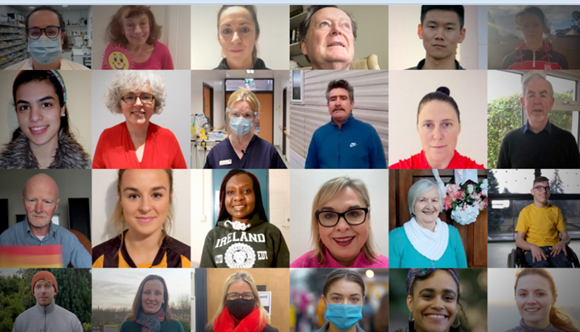
18 Nov 2021
HSE Partner Pack 18th November 2021

Dear Colleagues,
We hope this message finds you well.
Thank you for your continuing support in helping to share information about COVID-19. Our highlight communications updates for you from this week are:
- COVID-19 is still spreading in our communities. Vaccines are proven to be your best protection against serious illness from COVID-19, alongside the day to day protective measures we all need to keep in mind - clean hands, masks, leaving space.
- If you are a close contact of a person that tests positive for COVID-19, please find updated guidance here.
- COVID-19 vaccine boosters: If you’re aged 60 or over, or a frontline healthcare worker, you will be offered a COVID-19 vaccine booster dose about 6 months after your last vaccine. If you have had COVID-19, and you're due to get a booster vaccine dose, you'll need to wait until around 6 months after your positive test result. Read more about COVID-19 vaccine booster doses here.
- Free flu vaccine for all at-risk groups: The HSE encourages all at-risk groups to make an appointment with their GP or Pharmacist for their free flu vaccine. People at risk include all children aged 2 to 17, those aged 65 or over, people with certain long term conditions, and pregnant women. Visit www.hse.ie/flu
Public Health Measures
You can find the public health measures here.
New information videos in 10 languages to encourage pregnant women to get vaccinated against COVID-19
A new COVID-19 vaccine information video for pregnant women has been produced in a range of languages and the videos are now live on the HSE’s YouTube channel and being shared on social media.
The multi-lingual videos were created by the HSE’s National Social Inclusion Office and National Immunisation Office in partnership with Translate Ireland and encourage pregnant women to take up the COVID-19 vaccine. The videos are available here in the following languages: Arabic, French, Polish, Spanish, Portuguese, Romanian, Mandarin Chinese, Russian, Lithuanian and English.
Getting vaccinated is the best way to protect you and your baby from COVID-19. Being vaccinated will reduce the chance of you becoming very unwell from COVID-19 and reduce the chance of complications for your baby. Women at any stage of pregnancy are being offered an mRNA vaccine (Pfizer or Moderna) and we are strongly encouraging women to take up the COVID-19 vaccine, following a discussion with their obstetric caregiver. For information on COVID-19 and pregnancy, please see here.
COVID-19 Testing - Online Booking System
Full details of how to get tested are available here.
Common symptoms include high temp, dry cough and tiredness. If you have symptoms of COVID-19, it's very important to self-isolate and get tested as soon as possible. #StaySafe | #ForUsAll
COVID-19 Contact Tracing - Online System
If you test positive for COVID-19 you will get a text message. This will include a link to a website where you can upload contact details for your close contacts. If you do not use the website, a contact tracer will phone you to collect the details. You can find out more about close contacts here.
Close Contacts
If you are a close contact of someone with COVID-19 - but are fully vaccinated and have no symptoms - we will register you for antigen COVID-19 tests. Close contacts who have symptoms or who aren't vaccinated need a PCR test. Read more here.
COVID-19 Vaccination Programme
You can find the latest information on vaccines administered here.
Vaccines are making a difference
Every COVID-19 vaccine makes a difference, helping to reduce the amount of severe illness caused by COVID-19. We thank everyone who has already had their COVID-19 vaccine. If you haven’t registered yet, or someone in your network has yet to do so, they can:
- Check hse.ie for answers they can trust about the COVID-19 vaccines
- Talk to a pharmacist or GP – many are giving mRNA vaccines
- Call HSElive on 1800 700 700
or
If you cannot register online, you can call the COVID-19 helpline at Freephone: 1800 700 700 to register by phone.
Walk-in COVID-19 vaccination clinics
You can also get your vaccine without an appointment at a walk-in clinic. The walk-in clinics open this week are listed here.
Walk-in clinics are open for people aged 12 and older. Children aged 12 to 15 must attend with their parent or guardian.
Most walk-in clinics are for the first or second dose of the Pfizer/BioNTech vaccine. The type of vaccine being offered is listed next to the clinic’s details.
You can read about going to a walk-in vaccination clinic here.
Walk-in clinics are for first and second dose only. You cannot get a booster dose at a walk-in vaccination clinic. You can find more information on the booster dose here.
Find a pharmacy giving COVID-19 vaccines
Many pharmacies are now offering COVID-19 vaccines to people aged 12 and over. Find a pharmacy to book your vaccine appointment. You can find more information here.
Where to find COVID-19 Vaccination Information
We encourage everyone to read about the COVID-19 vaccine and to get their information from a factual, trusted source – here are the links to the pages with information on the vaccine:
- Check here for information about the vaccine, information on this page is updated regularly
- Find the vaccine information materials at hse.ie/covid19vaccinematerials
- Details on COVID-19 vaccines administered are available here
- Read the full COVID-19 Vaccine Allocation Strategy
- Read the National Immunisation Advisory Committee Chapter about COVID-19 vaccine
- COVID-19 vaccine information for health professionals
- Information in Irish Sign Language: information resources on the COVID-19 vaccines in Irish Sign Language are available here
- COVID-19 vaccines easy read and accessible information formats are available here
European Antibiotic Awareness Day (EAAD)
European Antibiotic Awareness Day (EAAD) is an annual event to remind everyone how valuable antibiotics are, how important it is that we only use them when we need them and that these amazing drugs are under threat from the growing problem of antibiotic resistance.
The HSE, in partnership with general practitioners and pharmacists has a website which gives practical, common sense advice and information on dealing with many common illnesses like colds, flu, earaches, sore throats, tummy bugs and rashes.
www.undertheweather.ie provides sound advice to give us the confidence and skill we need to take care of ourselves and our families without resorting to antibiotics. Antibiotics can cause more harm than good; they should be used only as prescribed and when needed.”
The best treatments for most common viral infections are rest, plenty of fluids and paracetamol or ibuprofen to treat fever and pain symptoms. Both doctors and patients in the community and the hospital need to keep in mind that antibiotics are a valuable resource and should only be used when the benefit is greater than the risk.
It is still important to get checked by your GP if you are worried especially for very young children, older people and those with long-term medical conditions or whose immune system is suppressed. Your GP will be able to judge if are likely to have and infection that needs treatment with an antibiotic. If your GP says you do not need an antibiotic this is good news because antibiotics are only for when you need them.
Further information about the European Antibiotic Awareness Day (EAAD) campaign is available at the bottom of this message and we would appreciate if you would share the information with your networks, colleagues and local organisations.
National Inpatient Experience Survey is underway
The National Inpatient Experience Survey is a nationwide survey asking patients about their recent experiences in hospital. The purpose of the survey is to learn from patients’ feedback in order to improve hospital care. All patients aged 16 years or older, who spend 24 hours or more in a public hospital during September have received a survey by post asking them to participate. A radio campaign encouraging eligibly participants to share their experience is running in November and December.
The survey is a partnership between the Health Information and Quality Authority (HIQA), the Health Service Executive (HSE) and the Department of Health. For more information, please visit yourexperience.ie
Free nasal spray flu vaccine for children
Children are twice as likely as adults to catch the flu, which can sometimes cause serious illness. That's why all children aged 2 to 17 can now get their free, nasal spray flu vaccine. It’s a safe and effective way to protect them, and the rest of the family too. Parents and guardians can now make an appointment with their GP or Pharmacist. Visit www.hse.ie/flu for more information.
Flu vaccine for people aged 65 or over
It’s time for people aged 65 or over to get their free, annual flu vaccine. While anyone can catch the flu, they’re more at risk of getting seriously ill or needing hospital treatment. The new flu vaccine is the best way to be protected from the flu, and it’s free from their GP or Pharmacist. Visit www.hse.ie/flu
Flu Vaccine is available for healthcare workers in Section 39 organisations
Flu vaccine and its administration are available free of charge to healthcare workers working in Section 39 organisations. Flu vaccine is available from a local GP or pharmacy or some workplaces provide flu vaccine through an occupational health clinic.
Visit www.hse.ie/flu for information about why it’s important for healthcare workers to get their flu vaccine.
START Talking Treats: The moderation conversation webinar
Thursday, 25th November (from 7:30-8:30pm)
You can register for the webinar here.
This webinar will bring together a panel of speakers, including parenting experts, who will provide their insights and tips in order to support parents and guardians to START the conversation of moderating treats.
The START campaign is a public health awareness campaign from safefood, the HSE and Healthy Ireland (ROI), the Public Health Agency and Department of Health (NI). The campaign has been designed to help parents and guardians start their kids on the way to a healthier life by providing practical advice and useful resources.
This webinar is open to everyone and will be of particular interest to parents and guardians of children aged 5-12 years.
Engaging Men Webinar on International Men’s Day: The When of Men’s Health
The Engaging Men Webinar will be on International Men’s Day, Friday the 19th November (from 12noon – 13.15pm). The webinar, which is the 4th in the series of Engaging Men webinars, will focus on ‘The When of Men’s Health’ and will include presentations on Men’s Health Week and a new initiative targeting farmer’s health and wellbeing, On Feirm Ground.
You can register for the webinar here.
COVID-19 Community Swabbers Recruitment
We are recruiting community swabbers for COVID-19 testing teams. You can find more information here.
Public Health Information
As always, for the most up to date information and advice on Coronavirus, please go to: https://www2.hse.ie/conditions/covid19/ and https://www.hpsc.ie/a-z/respiratory/coronavirus/novelcoronavirus/. Clinical and professional guidance relating to COVID-19 is available on www.hpsc.ie where you’ll find up to date guidance for healthcare settings and non-clinical settings.
Please check here for the most up to date partner resources for COVID-19.
You can find the COVID-19 A-Z information here from the HSE’s Health Protection Surveillance Centre (HPSC).
Please also check the Healthy Ireland site here with further resources and information on the Keep Well campaign.
You can view the latest information on how Ireland is responding to cases of COVID-19 here.
Ireland’s COVID-19 Data Hub is available here.
If your organisation has any requests in relation to COVID-19 public health information materials, please reply directly to this email to let us know.
Many thanks and best wishes,
Kahlil and Sandra
COVID-19 Stakeholder Engagement, HSE Communications
Contact Information
HSE Partner Pack
kahlil.coyle@hse.ie

